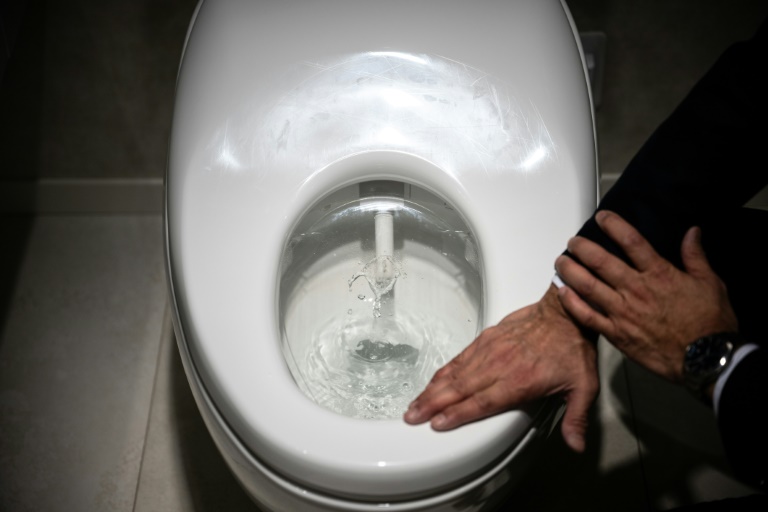As Japan welcomes record numbers of tourists, the high-tech toilets that inhabit one of the country's more private attractions are becoming a staple in luxury bathrooms around the world.
Bidet toilets, with their heated seats and sophisticated cleaning technology, are the norm in Japan, with more than 80 percent of homes equipped with them, according to a government survey.
Now, sales are soaring overseas, especially in the US, thanks to A-list bidet enthusiasts like Drake, the Kardashians and Alexandria Ocasio-Cortez.
Toto, the Japanese company that pioneered the electric bidet and claims to have sparked a “global revolution from wiping to washing,” said its overseas sales of toilets have nearly doubled from 100 billion yen ($673 million) in 2012.
The pandemic has led to a boom in home improvement efforts, but it's also been a major factor as hygiene-conscious consumers desperately search for alternatives to toilet paper after panic buying meant that the commodity sold out.
Shinya Tamura, a senior executive who oversees Toto's international operations, told AFP the brand's growth was a word-of-mouth success.
When people first learn how a toilet's water flow works by regulating pressure and temperature, they “get the impression that it's not a pleasant thing,” he says.
However, Tamura says, “It's impossible to explain how good it is in words. You have to experience it for yourself.”
“After a while, most users can't live without it.”
The company's overseas sales of home appliances are currently less than one-third of its sales in Japan.
The company wants to increase sales in the Americas by 19 percent over two years to “solidify its position” in the continent and make up for less urgent demand in China.
But as more people seek a clean butt, American competitors are challenging Japanese rivals such as Toto, Panasonic and Lixil for the throne.
– “The smartest toilet” –
At a major tech trade show in Las Vegas this year, a marketing manager for US brand Kohler called its Numi 2.0, which takes voice instructions via a built-in Amazon Alexa, “the smartest toilet out there.”
Like the top-of-the-line Japanese models, the Numi 2.0 has an automatic deodorizer and a motion-sensing lid that opens when you enter the bathroom and closes when you leave.
The spray wand has pulsation and vibration functions, allowing you to fine-tune your hot air dryer.
But such luxury comes at a cost: about $8,500 to $10,000 compared to about $500 for a more basic bidet seat.
A salesperson at Ardie's Bath Collection in Beverly Hills told AFP that Americans travelling to Japan often want to upgrade their toilets.
“You see it in airports and public restrooms, you use it, and you think, 'Wow, this is amazing,'” he said.
Although bidets are “popular everywhere,” for some customers it's still a “private experience” and “weird to talk about.”
Luxury Japanese-style toilets are fast becoming a status symbol, but Toto executives have long battled modesty as they try to expand overseas.
After launching the Washlet in the United States in 1986, the company struggled to get advertising exposure and canceled pop-up events in upscale shopping malls after complaints from other stores.
– 'Does it hurt?'
How things have changed in the share-everything internet age.
“Why am I nervous? Does it hurt? Is it cold?” Spencer Barbosa, a 21-year-old Canadian with 10 million followers on TikTok, said in a video of himself trying out Japanese toilets.
Superstar rapper Drake made a grand gesture to kick off 2022 by gifting his friend DJ Khaled a luxury Toto toilet.
And US Representative Ocasio-Cortez joked in an Instagram video last year that after visiting Japan, she was going to buy a bidet because “life will never be the same again”.
Interestingly, when Toto first started selling bidets to Japanese hospitals, the company imported them from the US, but users complained about an unstable water flow.
The company was founded in 1917 by a father and son from a wealthy business family who wanted to bring Western-style ceramic toilets to Japan.
At the time, there was no sewer system and squat toilets were the norm, so business struggled and the company relied on selling tableware until habits began to change after the 1970 Osaka Expo, said Junichi Koga, director of the Toto History Museum.
More than 300 employees helped develop and test the Washlet, designating locations for the water flow.
Toto currently sells 60 million Washlets worldwide and has even appeared on “Keeping Up With the Kardashians” and in an episode of “South Park” where the company was parodied as “Toottoot.”
As the bidet trend spreads, Ardie's salesman said people with reservations may eventually change their minds.
He advises his clients to install any electrical needs they may have when renovating their bathroom, telling them, “You can always buy it later.”
nf/kaf/sco/cwl


